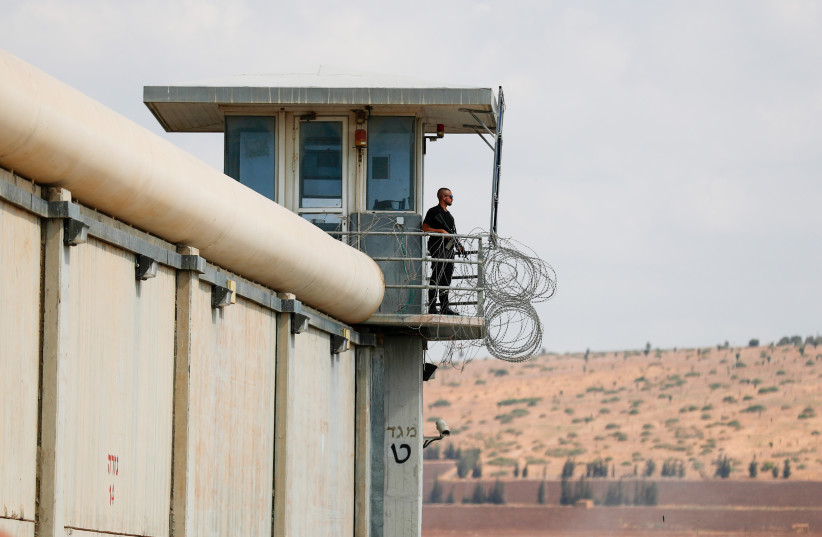When it comes to the Gilboa Prison pimping affair and the variety of comments from politicians and senior officials over the last few days, there is one thing missing: accountability.
If one were to listen to or read statements from Prime Minister Yair Lapid, Public Security Minister Omer Bar Lev or President Isaac Herzog, they might be led to believe that nobody understood how Muhammad Atallah, the Fatah terrorist held in Gilboa Prison, was even able to access the women.
“The publications on the subject are horrifying... any incident of violence against women in organizations that answer to me will be treated with utmost severity,” Bar Lev said last Thursday.
Lapid on Sunday said, “It cannot be that an IDF soldier was raped during her service by a terrorist.” That was one day before Herzog added his voice to those decrying the affair, asking: “How did we get to the horrifying situation where the bodies of the women protecting us were made expendable?”
"The publications on the subject are horrifying...any incident of violence against women in organizations that answer to me will be treated with the utmost severity."
Public Security Minister Omer Bar-Lev
However, the answer as to how this happened has been given six times by six women, all alleging that they were given over, or “pimped out” to Atallah in exchange for information. Six women have alleged that their commanders knew about, allowed and even helped coordinate the plan to allow Atallah one-on-one time with young female guards.

And while it’s true that former Gilboa Prison intelligence officer Rani Basha was finally dismissed from the Israeli Prison Service last month, his name was first mentioned in relation to the affair back in 2018, more than four years before he was fired.
Not only was Basha not dismissed after a 2019 investigation found that his actions left him “no longer suitable to serve in the IPS,” he was even promoted late last year.
It wasn’t just that Basha was connected loosely to the affair either, but rather that he reportedly admitted during a police investigation that he specifically placed female security guards in the security wing, moving them from the criminal wing, following the demands of Atallah.
And what about all the direct commanders of the women who were sent to Atallah? Surely, one might assume that if they had just known about the security prisoner’s deal with senior prison staff, they would have done what they could to protect those under their command. However, according to “Yael” and “Hila” (not their real names), who both testified about the affair, their commanders knew about Atallah but did nothing.
“My commanders handed me over to that terrorist... made sure that I was left alone with him,” recounted Hila, while Yael alleged that the complaints she filed to her commanding officers went unheeded.
While the trauma and abuse the women suffered at the hands of Atallah are horrific and unimaginable, it is not the part of the story that should shock anyone.
That a high-security terrorist serving a life sentence plus 15 years would do unthinkable things to girls is not that shocking. But that senior IPS officials, who are entrusted with the job of keeping Israeli society safe, would enable and assist him in his behavior is almost unbelievable.
So why is nobody talking about it?
Because mentioning the role played by Israeli security officials would require accountability. It would require admitting that the system itself is broken. It would require acknowledging the deep-rooted systemic violence faced by women in Israel, especially within the IDF and other security forces.
Mentioning Atallah’s role in the pimping affair is easy. It keeps things neatly in their boxes and allows for strong statements devoid of real intent from politicians looking to score points. That’s not to say that Atallah should be removed from the affair entirely, but rather to say that the people who are missing from it right now must be added in.
In a speech on Monday at Ofer Prison, Lapid addressed senior members of the IPS, as well as 25 female prison guards. “The State of Israel will not stand idly by while there is a suspicion that a drafted prison officer was raped or assaulted by terrorists,” he said. “Yet we will keep this organization as a whole; the life of every Israeli citizen is dependent on it.”
And therein lies the problem. When acknowledging only the role of Atallah, while simultaneously praising the very system that allowed and assisted him to do what he did, Israel’s leaders are ensuring that while things on the surface might appear to be changing, the deep rot at the core of the system will simply continue to spread.
